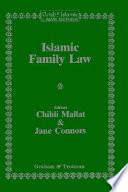
The Islamic Law of Nations
Shaybani's Siyar
From its origins Islam has been an expansionist religion, understanding itself as a matter of faith to be in a permanent state of war with the non-Muslim world. After the initial consolidation of the Islamic caliphate, however, it soon became apparent that constant military hostilities could not be sustained and that other forms of relationship with non-Muslim nations would be necessary. To reconcile the imperatives of faith with the limits of military power, Islamic scholars developed elaborate legal doctrines. In the second century of the Muslim era (eighth century C.E.), hundreds of years before the codification of international law in Europe by Grotius and others, Muhammad ibn al-Hasan al-Shaybani, an eminent jurist of the Hanafite school in present-day Iraq, wrote the first major Islamic treatise on the law of nations, Kitab al-Siyar al-Kabir. Translated with an extensive commentary by Majid Khadduri, Shaybani's Siyar describes in detail conditions for war (jihad) and for peace, principles for the conduct of military action and of diplomacy, and rules for the treatment of non-Muslims in Muslim lands. A foundational text of the leading school of law in Sunni Islam, it provides essential insights into relations between Islamic nations and the larger world from their earliest days up to the present.
- ISBN 13 : 9780801869754
- ISBN 10 : 0801869757
- Judul : The Islamic Law of Nations
- Sub Judul : Shaybani's Siyar
- Pengarang : Muḥammad ibn al-Ḥasan Shaybānī, Majid Khadduri, Majid Khadduri, Majid Khadduri, Majid Khadduri, Majid Khadduri, Majid Khadduri, Majid Khadduri, Majid Khadduri, Majid Khadduri, Majid Khadduri, Majid Khadduri, Majid Khadduri, Majid Khadduri, Majid Khadduri, Majid Khadduri, Majid Khadduri, Majid Khadduri, Majid Khadduri, Majid Khadduri, Majid Khadduri, Majid Khadduri, Majid Khadduri,
- Kategori : History
- Penerbit : JHU Press
- Bahasa : en
- Tahun : 2001
- Halaman : 311
- Google Book : http://books.google.com/books?id=89spaKByt_MC&dq=intitle:ISLAMIC+LAW&hl=&source=gbs_api
-
Ketersediaan :
Islamic Law and the Law of Nations Islam and the Community of Nations The
modern law of nations presupposes the existence in the world of sovereign
territorial groups gathered together to form a community of nations, each
possessing its ...









